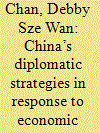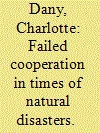|
|
|
Sort Order |
|
|
|
Items / Page
|
|
|
|
|
|
|
| Srl | Item |
| 1 |
ID:
174860


|
|
|
|
|
| Summary/Abstract |
The effectiveness of public diplomacy is now increasingly the subject of scientific measurement and testing by researchers in the field of International Relations. While there are variety of empirical efforts to uncover the power of public diplomacy, extant studies have mostly focused on the activities initiated by the ministries in charge of external relations. In this article, rather than external relations ministries and agencies, we focus on the effectiveness of public diplomacy by the military. Specifically, we argue that figures, pictures and indeed videos created by military forces have power in changing perceptions among the receivers of the information. In this particular study, we show that a 38 second video made by the US military induces positive feelings for cooperation which would otherwise be difficult to sustain between South Korea and Japan — two countries which have suffered highly fractious relations, yet which are indispensable allies to the US in countering the rising threat from North Korea.
|
|
|
|
|
|
|
|
|
|
|
|
|
|
|
|
| 2 |
ID:
174859


|
|
|
|
|
| Summary/Abstract |
For almost a century before the formal alliance between the United States and Australia in 1941, a relationship was being formed around interrelated perceptions of shared identity and economic, political, and strategic interests. Perhaps the single most important factor in the recognition of shared interests lay in the mutually reinforcing fears of a multilayered ‘Asia threat’ that developed in parallel in both countries, originating as a demographic fear over Chinese migration during gold rushes of the 1850s, and progressing to focus on the growing military power of imperial Japan and geostrategic dominance of the Pacific. In recent years, the rise of China has been the central focus of US–Australia alliance, and, in many respects, the security architecture used to confront China is a legacy of the historical ‘Asia threat’. Understanding the historical context of the relationship is necessary for dispelling the anachronistic ‘Asia threat’ perceptions from the contemporary security policy.
|
|
|
|
|
|
|
|
|
|
|
|
|
|
|
|
| 3 |
ID:
174863


|
|
|
|
|
| Summary/Abstract |
How do societal actors in the host country matter to Beijing’s diplomatic strategies? In the course of political transition in Myanmar, the Myitsone Dam was suspended in 2011, and the China–Myanmar High-Speed Railway was reportedly halted in 2014. Since then, Beijing is said to have adopted public diplomacy in response to these economic setbacks. However, this article finds variations in Beijing’s approaches; Beijing actively engaged with the dam challengers, but not the railway opponents, who offered less of a challenge. Moreover, Beijing tolerated the project’s suspension in the dam case, but ramped up pressure in the railway case by increasing Naypyitaw’s costs of defection. Beijing’s inconsistent diplomatic approaches are attributed to different levels of social opposition observed in the anti-Chinese project movements. As such, Beijing has the propensity to bypass societal actors and pressure Naypyitaw for project continuation if it perceives that social opposition is not a major obstacle in bilateral economic cooperation.
|
|
|
|
|
|
|
|
|
|
|
|
|
|
|
|
| 4 |
ID:
174858


|
|
|
|
|
| Summary/Abstract |
This article asks why economically strong democracies reject humanitarian aid after severe natural disasters, focusing on the Kobe earthquake in Japan (1995), India’s response to the Indian Ocean tsunami (2004), and Hurricane Katrina in the United States (2005). It explains these rejections of humanitarian aid by analyzing the decision-makers’ ‘self-perceptions’ through the factors of manageability, national role perceptions, and domestic political impact, as well as ’other-perceptions’ through their relations to donors and the nature of the aid offers. It finds that even in those disaster-prepared and economically strong democracies, state leaders rejected humanitarian aid not simply because they had sufficient disaster management capabilities. Rather, bureaucratic hurdles and administrative failure impeded aid acceptance. Moreover, conceptions of those countries’ roles as established or emerging donors, as well as domestic political factors influenced their decisions. Ultimately, the dominant explanations focusing on wealth and capabilities are thus too shortsighted. Not only giving but also rejecting humanitarian aid follows political considerations.
|
|
|
|
|
|
|
|
|
|
|
|
|
|
|
|
| 5 |
ID:
174862


|
|
|
|
|
| Summary/Abstract |
Strong economic growth and assertive political leadership have made India an increasingly prominent player in global governance. Whereas conventional scholarship of India’s foreign policy underlines continuity, this article explores how India’s self-conception has changed across two policy fields (climate change and maritime security). Adopting a role-theoretical approach, we analyze official statements as a mirror of both India’s self-understanding and its view on the roles of significant other actors. Although both issue-areas exhibit change, India’s self-ascribed role has been transformed more profoundly in the maritime domain. Our comparison suggests three factors to particularly induce transformation of rising powers’ roles toward ‘more responsibility’: First, power-sharing is more conducive than burden-sharing; second, issue-areas with strong regional anchors are more likely to induce the adoption of a more responsible role than those areas situated primarily at the global level of politics; and third, positive external role ascriptions are more effective than negative ones.
|
|
|
|
|
|
|
|
|
|
|
|
|
|
|
|
|
|
|
|
|